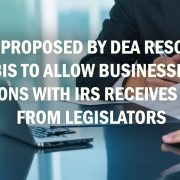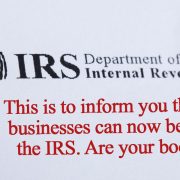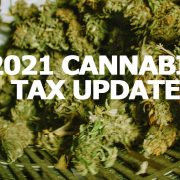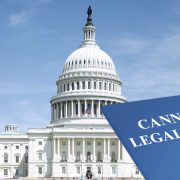New Rule Proposed By DEA Rescheduling Cannabis To Allow Businesses More Deductions With IRS Receives Support From Legislators
The prime benefits of classifying cannabis as a Class 3 substance is that the Federal government would recognize medical benefits of cannabis, make Section 280E inapplicable to licensed cannabis operators, and open up financial and banking markets.
The Associated Press reported on April 30, 2024 that the Drug Enforcement Administration (“DEA”) will propose a rule to reschedule cannabis to Schedule III under the Controlled Substance Act. The proposed rule has since been reviewed by the Department Of Justice and on May 16, 2024 has been published in the Federal Register. This publication then opened the period of time to July 22, 2024 for the DEA to take public comment on the plan to move marijuana from its current classification as a Schedule I drug, alongside heroin and LSD. The proposed rule moves cannabis to Schedule III, alongside ketamine and some anabolic steroids, following a recommendation from the federal Health and Human Services Department. More than 40,000 people submitted comment with a vast majority indicating favor of the proposed rule reclassifying cannabis. The proposed rule is now up for review by an administrative judge. If approved, the agency can then publish the final rule in the Federal Register.
The Growing Trend In Legalizing Cannabis – Current Standings:
Medical marijuana is legal in 38 states.
The medical use of cannabis is legal (with a doctor’s recommendation) in 38 states and Washington DC. Those 38 states being Alabama, Alaska, Arizona, Arkansas, California, Colorado, Connecticut, Delaware, Florida, Hawaii, Illinois, Kentucky, Louisiana, Maine, Maryland, Massachusetts, Michigan, Minnesota, Mississippi, Missouri, Montana, Nevada, New Hampshire, New Jersey, New Mexico, New York, North Dakota, Ohio, Oklahoma, Oregon, Pennsylvania, Rhode Island, South Dakota, Utah, Vermont, Virginia, Washington and West Virginia. The medical use of cannabis is also legal in the territories of the Northern Mariana Islands, Guam and Puerto Rico.
Recreational marijuana is legal in 24 states.
Twenty-three states and Washington DC, have legalized marijuana for recreational use — no doctor’s letter required — for adults over the age of 21. Those 23 states being Alaska, Arizona, California, Colorado, Connecticut, Delaware, Illinois, Maine, Maryland, Massachusetts, Michigan, Minnesota, Missouri, Montana, Nevada, New Jersey, New Mexico, New York, Ohio, Oregon, Rhode Island, Vermont, Virginia and Washington and the territories of the Northern Mariana Islands and Guam.
Recreational marijuana is legal in 6 tribal nations.
Six Tribal nations have legalized marijuana for recreational use. Those 6 tribes being the Flandreau Santee Sioux Tribe (South Dakota), Oglala Lakota Sioux Tribe (South Dakota), Suquamish Tribe (Washington state), Squaxin Island Tribe (Washington State), Eastern Band of Cherokee Indians (North Carolina) and St. Regis Mohawk Tribe (New York).
The New Rule If Approved Will Put Federal Law More In Line With State Laws.
Currently, under Federal law (Controlled Substances Act 21 U.S.C. 801) marijuana is designated as a Schedule I controlled substance due to the historical belief that it has a high potential for abuse, no currently accepted medical use in treatment, and lack of accepted safety for use under medical supervision.
The New Rule If Approved Will Result In A Tax Regime Similar To What Non-Cannabis Businesses Face.
Generally, businesses can deduct ordinary and necessary business expenses under I.R.C. §162. This includes wages, rent, supplies, etc. However, in 1982 Congress added I.R.C. §280E. Under §280E, taxpayers cannot deduct any amount for a trade or business where the trade or business consists of trafficking in controlled substances…which is currently prohibited by Federal law. Marijuana, including medical marijuana, is a controlled substance. What this means is that dispensaries and other businesses trafficking in marijuana have to report all of their income and cannot deduct rent, wages, and other expenses, making their marginal tax rate substantially higher than most other businesses. Therefore, under current law, the Internal Revenue Code which treats businesses in the marijuana industry differently resulting in such business paying at least 3-times as much in taxes as ordinary businesses.
The New Rule If Approved DOES NOT Change Reporting Of Cash Payments.
The Bank Secrecy Act of 1970 (“BSA”) requires financial institutions in the United States to assist U.S. government agencies to detect and prevent money laundering. Specifically, the act requires financial institutions to keep records of cash purchases of negotiable instruments, and file reports of cash purchases of these negotiable instruments of more than $10,000 (daily aggregate amount), and to report suspicious activity that might signify money laundering, tax evasion, or other criminal activities. The BSA requires any business receiving one or more related cash payments totaling more than $10,000 to file IRS Form 8300, Report of Cash Payments Over $10,000 Received in a Trade or Business.
The minimum penalty for failing to file EACH Form 8300 is $25,000 if the failure is due to an intentional or willful disregard of the cash reporting requirements. Penalties may also be imposed for causing, or attempting to cause, a trade or business to fail to file a required report; for causing, or attempting to cause, a trade or business to file a required report containing a material omission or misstatement of fact; or for structuring, or attempting to structure, transactions to avoid the reporting requirements. These violations may also be subject to criminal prosecution which, upon conviction, may result in imprisonment of up to 5 years or fines of up to $250,000 for individuals and $500,000 for corporations or both.
Marijuana-related businesses operate in an environment of cash transactions as many banks remain reluctant to do business with many in the marijuana industry. Like any cash-based business the IRS scrutinizes the amount of gross receipts to report and it is harder to prove to the IRS expenses paid in cash. So it is of most importance that the proper facilities and procedures be set up to maintain an adequate system of books and records.
So with all these potential benefits, what forces are present to block this proposed rule?
- Chevron Doctrine repealed by U.S. Supreme Court. The regulatory state has been in full force since, ironically, 1984, with the institution of the Chevron Doctrine. The Chevron Doctrine has required courts to defer to the expertise of administrative agencies when the legislative intent of an underlying law is ambiguous, which made it a cornerstone of how regulators and businesses interact. But on June 28, 2024, the Supreme Court’s Republican-appointed majority demolished the doctrine in its rulings in the Relentless v. Department of Commerce and Loper Bright Enterprises v. Raimondo appeals, overturning the broad authority of the administrative state and raising fresh questions about how cannabis will be regulated moving forward. Keep in mind that rescheduling has been moving forward as a regulatory, rather than a legislative, change, and now, regulations do not hold the same force of law as they did since 1984. But even if the Chevron Doctrine was not repealed, the normal rule making process still faces certain congressional and judicial challenges explained further below.
- Congressional Challenges. Under the Small Business Regulatory Enforcement Fairness Act (also known as the Congressional Review Act), new final rules must be sent to Congress and the Government Accountability Office for review before they can take effect. “Major rules” (ones that are economically significant and require OIRA review) must be made effective at least 60 days after the date of publication in the Federal Register, allowing time for Congressional review. In emergency situations, a major rule can be made effective before 60 days. If the House and Senate pass a resolution of disapproval and the President signs it (or if both houses override a presidential veto), the rule becomes void and cannot be republished by an agency in the same form without Congressional approval. Since 1996, when this process started, Congress has disapproved only one rule. Congress may also exercise its oversight in other ways, by holding hearings and posing questions to agency heads, by enacting new legislation, or by imposing funding restrictions.
- Judicial Challenges. Individuals and corporate entities may go into the courts to make a claim that they have been, or will be, damaged or adversely affected in some manner by a regulation. The reviewing court can consider whether a rule: is unconstitutional; goes beyond the agency’s legal authority; was made without following the notice-and-comment process required by the Administrative Procedure Act or other law; or was arbitrary, capricious, or an abuse of discretion. An agency head can also be sued for failing to act in a timely manner in certain cases. If a court sets aside (vacates) all or part of a rule, it usually sends the rule back to the agency to correct the deficiencies. The agency may have to reopen the comment period, publish a new statement of basis and purpose in the Federal Register to explain and justify its decisions, or restart the rulemaking process from the beginning by issuing a new proposed rule.
The most certain way that cannabis can be legalized and thus be treated like any other lawful business is by Congress enacting legislation.
Top Democratic senators, including Senate Majority Leader Chuck Schumer (D-NY), continue to push the DEA to ‘promptly finalize” the rule to reschedule marijuana. On August 2, 2024 Sen. Schumer, Sen. Cory Booker (D-NJ), Sen. Ron Wyden (D-OR) and others sent a letter to Attorney General Merrick Garland and DEA Administrator Anne Milgram imploring the administration to follow through on a proposal to move cannabis from Schedule I to Schedule III of the Controlled Substances Act (CSA), as the Justice Department formally proposed in May. What is so surprising is that these legislators have the power to enact legislation completely bypassing the DEA’s rule-making authority and potential judicial challenges and send a bill to the President rescheduling cannabis or even excluding cannabis from the application of IRC Sec. 280E.
How Do You Know Which Cannabis Tax Attorney Is Best For You?
Given that cannabis is still illegal under existing Federal law you need to protect yourself and your marijuana business from all challenges created by the U.S. government so it is best to be proactive and engage an experienced cannabis tax attorney in your area who is highly skilled in the different legal and tax issues that cannabis businesses face. Let the cannabis tax attorneys of the Law Offices Of Jeffrey B. Kahn, P.C. located in Orange County (Irvine), the Inland Empire (Ontario and Palm Springs) and other California locations protect you and maximize your net profits. And if you are involved in crypto currency, check out what a bitcoin tax attorney can do for you.










 Follow
Follow Follow
Follow